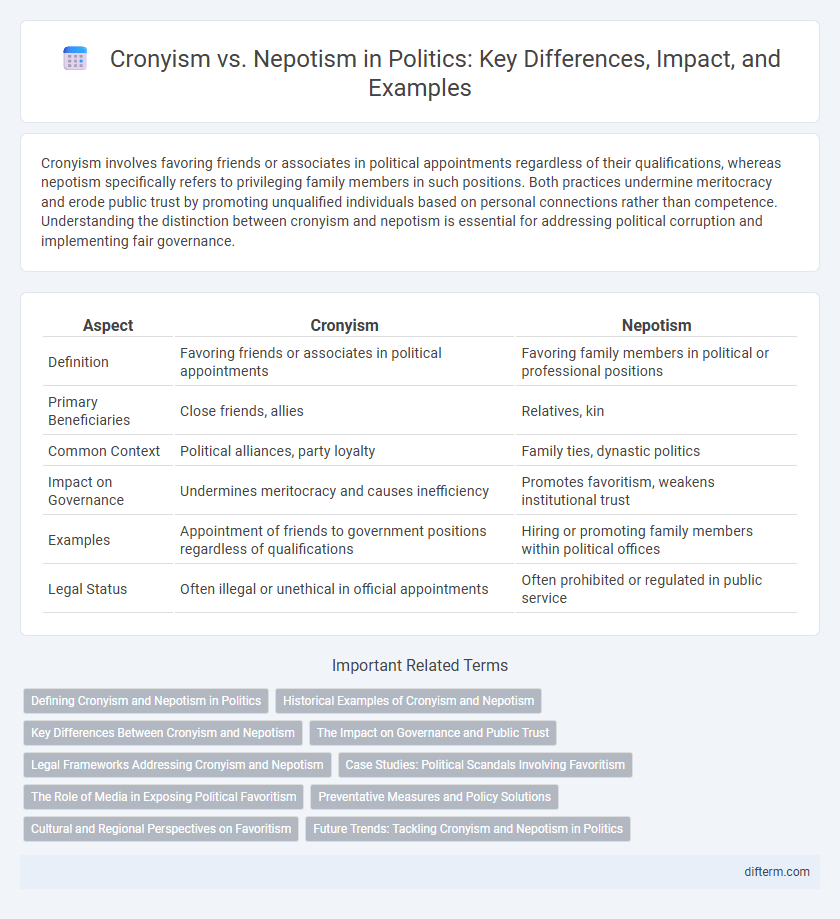Cronyism involves favoring friends or associates in political appointments regardless of their qualifications, whereas nepotism specifically refers to privileging family members in such positions. Both practices undermine meritocracy and erode public trust by promoting unqualified individuals based on personal connections rather than competence. Understanding the distinction between cronyism and nepotism is essential for addressing political corruption and implementing fair governance.
Table of Comparison
| Aspect | Cronyism | Nepotism |
|---|---|---|
| Definition | Favoring friends or associates in political appointments | Favoring family members in political or professional positions |
| Primary Beneficiaries | Close friends, allies | Relatives, kin |
| Common Context | Political alliances, party loyalty | Family ties, dynastic politics |
| Impact on Governance | Undermines meritocracy and causes inefficiency | Promotes favoritism, weakens institutional trust |
| Examples | Appointment of friends to government positions regardless of qualifications | Hiring or promoting family members within political offices |
| Legal Status | Often illegal or unethical in official appointments | Often prohibited or regulated in public service |
Defining Cronyism and Nepotism in Politics
Cronyism in politics refers to the practice of appointing friends and associates to positions of power regardless of their qualifications, undermining meritocracy and transparency. Nepotism specifically involves favoritism shown to relatives by granting them roles or advantages within political institutions, often leading to conflicts of interest and decreased public trust. Both practices erode democratic principles by prioritizing personal relationships over competence and fairness in governance.
Historical Examples of Cronyism and Nepotism
Historical examples of cronyism include the political appointments during the Gilded Age in the United States, where industrialists and politicians exchanged favors to consolidate power and wealth. Nepotism is exemplified by the Medici family in Renaissance Florence, who secured key church and political positions for relatives to maintain influence. Both practices undermine meritocracy and have repeatedly distorted governance and public trust across different eras and regions.
Key Differences Between Cronyism and Nepotism
Cronyism involves favoritism shown to close friends in political appointments or business, while nepotism specifically refers to favoritism granted to family members. Both practices undermine meritocracy but differ in the relationship basis: cronyism relies on personal loyalty and alliances, whereas nepotism is rooted in blood relations. Understanding these distinctions is crucial for analyzing corruption and governance challenges in political systems.
The Impact on Governance and Public Trust
Cronyism and nepotism erode governance quality by prioritizing personal relationships over merit, leading to unqualified appointments and inefficient public service delivery. This favoritism undermines institutional integrity, resulting in decreased transparency and accountability within government bodies. Public trust diminishes as citizens perceive corruption and unfair practices, weakening civic engagement and democratic stability.
Legal Frameworks Addressing Cronyism and Nepotism
Legal frameworks addressing cronyism and nepotism in politics vary by jurisdiction but commonly include anti-corruption laws, conflict of interest regulations, and transparency requirements to ensure fair hiring and contracting processes. Independent oversight bodies and whistleblower protections play critical roles in enforcing these laws and deterring favoritism that undermines democratic governance. Effective legislation combines clear definitions of prohibited practices with mechanisms for accountability and public reporting to uphold institutional integrity.
Case Studies: Political Scandals Involving Favoritism
Political scandals like the Watergate affair exposed cronyism where officials granted favors to known associates, while the Biden family's business dealings highlight nepotism through preferential treatment of relatives. The case of Japan's Moritomo Gakuen scandal showcases cronyism with prime ministerial ties influencing land deals, contrasting with South Korea's Park Geun-hye nepotism allegations surrounding presidential confidantes. These case studies reveal how favoritism undermines democratic institutions and erodes public trust globally.
The Role of Media in Exposing Political Favoritism
Media plays a crucial role in exposing political favoritism by investigating and highlighting instances of cronyism and nepotism within government institutions. Investigative journalism uncovers unethical relationships and conflicts of interest that undermine democratic transparency and accountability. Through widespread dissemination, media pressure can prompt reforms and hold political figures accountable for favoritism practices.
Preventative Measures and Policy Solutions
Preventative measures against cronyism and nepotism in politics include implementing strict transparency and accountability frameworks, such as mandatory disclosure of political connections and financial interests. Policy solutions should enforce merit-based recruitment and promotion systems independent of personal relationships, supported by robust independent oversight bodies with power to investigate and sanction abuses. Digital tools leveraging blockchain can enhance traceability of hiring and contracting processes, reducing opportunities for favoritism and increasing public trust.
Cultural and Regional Perspectives on Favoritism
Cronyism and nepotism exhibit distinct cultural and regional variations in their manifestations and social acceptance, often influenced by local traditions and governance norms. In many East Asian and Middle Eastern societies, familial loyalty through nepotism is culturally embedded, whereas Western political systems tend to emphasize meritocracy but still face persistent cronyism within elite networks. Understanding these cultural nuances is essential for developing region-specific anti-corruption policies and promoting political transparency globally.
Future Trends: Tackling Cronyism and Nepotism in Politics
Emerging technologies like blockchain and AI are being leveraged to increase transparency and accountability in political funding and appointments, effectively curbing cronyism and nepotism. Legislative reforms worldwide are increasingly imposing stricter regulations and conflict-of-interest disclosures for public officials to prevent favoritism. Public demand for merit-based governance and independent oversight bodies is driving a global shift toward ethical political practices, enhancing democratic resilience against corrupt networks.
Cronyism vs Nepotism Infographic

 difterm.com
difterm.com